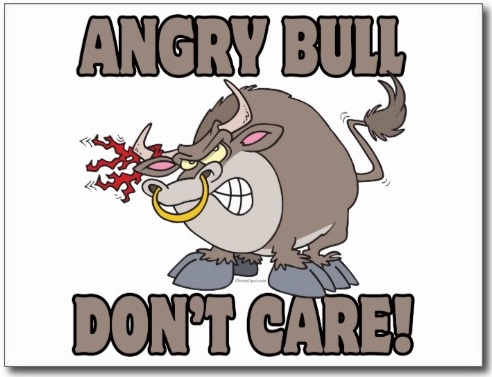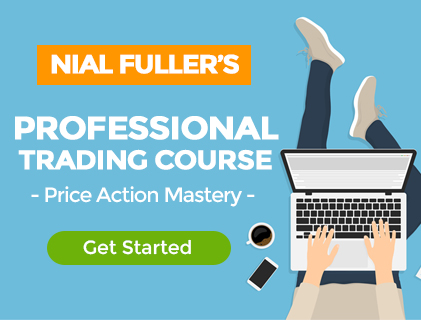What Makes a Successful Forex Trader?
 This article will look hard at what makes a Forex trader successful. It deals with taking responsibility for one’s actions and emotions in the market, including the issue of adherence to your own trading rules.
This article will look hard at what makes a Forex trader successful. It deals with taking responsibility for one’s actions and emotions in the market, including the issue of adherence to your own trading rules.
Successful traders have acquired certain skills and habits that they have finely adapted and tuned to their interactions with the unique environment of the market. Genetics do play a role. For instance, spatial thinking skills are an advantage, but that does not mean that someone with poor spatial skills cannot become a successful trader. For what really seems to divide the winners from the losers is the ability to take responsibility for our every action and to possess the ability to to recognize, accept and be master of one’s emotions, and this takes training, more specifically, mental training. For trading is much more of a mental than a physical activity. Opinions vary (70-90%) but the importance of the right attitude, belief in success and the control over emotions is paramount.
Being a successful trader is thus first and foremost about taking FULL RESPONSIBILITY for every action, decision taken and emotion expressed in the market place.
Repetitive behavior can fuel success or failure
When we repeat a particular behavior over and over again, a neural pathway becomes engrained in the brain. And eventually, that behavior becomes automatic in that we need to use very little of our conscious mind to execute it. Take the well-quoted example of learning to drive. When we begin to drive, we have to concentrate on every move we make: clutch, accelerator, gear changes. But as we become proficient, we can do all these tasks automatically.
But emotions drive behavior. An angry driver is a danger on the road. An angry trader can do a lot of damage – but only to himself. This difference alone underlines the uniqueness of the one-sided nature of interactions with the market.
Of course, behaviors can be viewed as good and bad, helpful and non-helpful. Successful traders have programmed their brains to execute their trades automatically and consistently, without hesitation and without the influence of destructive emotion. They have done so by learning and repeating those behaviors – driven by positive emotion – that support their goal: to make money. In doing so, those behaviors that worked against them are discontinued and through lack of rehearsal, become obsolete.
It is more difficult and takes longer to ‘undo’ a bad habit and replace it with a good one than to learn the good one from scratch. For instance, someone who has taught himself golf will probably have to ‘unlearn’ many bad swings before his brain is reprogrammed for better ones. The novice golfer however does not have to go through this exasperating procedure if what is learned from the beginning is conducive to success. These principles apply of course to trading as much as to any other learning process.
The market doesn’t care if you win or lose
 The trader soon realizes – usually to his detriment – that the market is an environment like no other. As such, it demands the more stringent adherence to behaviors and certain emotions than is required of us in our daily lives. Most traders fail in this deceptively simple task and so fail in the market. The market is unlike our daily norm, where everything is played by rules. Other people’s rules. For example, there are driving rules and parking rules. We go to school and if we study well, we pass the class. There are rules about how we should relate to others, we negotiate and we reach a compromise or we are ostracized.
The trader soon realizes – usually to his detriment – that the market is an environment like no other. As such, it demands the more stringent adherence to behaviors and certain emotions than is required of us in our daily lives. Most traders fail in this deceptively simple task and so fail in the market. The market is unlike our daily norm, where everything is played by rules. Other people’s rules. For example, there are driving rules and parking rules. We go to school and if we study well, we pass the class. There are rules about how we should relate to others, we negotiate and we reach a compromise or we are ostracized.
But in the market? A trader can shout and scream at the charts to no effect whatsoever. A trader can cry and plead and pray and ‘hope’ but the charts just keep on doing their own thing day in day out. Unless we possess extremely large sums of money, there is nothing we can do to influence trend or direction. The only power we have is how WE CHOOSE to interact with the price action patterns that we see unfolding in front of us. We can decide if we want to trade with or against the trend, where we enter and exit, and when a loss should be cut to move onto better opportunities.
This degree of freedom is without boundaries. It is just this freedom that attracts so many to the trading table in the first place. All that is needed they think is a computer and an internet connection and “I’ll be rich in no time”. After all, there are only three possibilities, up, down or sideways, so it can’t be that difficult, right? But any trader will tell you that trading is not that simple at all. Managing to survive in an environment with no rules, where decisions are 100% subjective, where vast amounts of money can be won or lost in seconds, where every trader is out to get a slice of the pie at someone else’s expense, is an enormous challenge and not for the weak hearted.
To succeed in trading you have to take responsibility
Being a successful trader has a critical component in common with being successful in all other areas of life. We may not be able to control the cards life gives us but we can control how we ‘deal our hand’ by controlling our actions and emotions. The market is 100% emotionless but human beings are not. Thus the highly-charged air found around most traders’ tables that can be cut with a knife comes solely from that trader. The emotions that make our daily lives difficult will cut you off at the knees in the market. Whether excitement, anticipation, risk-taking, thrill-seeking, panic, fear or the expectations of limitless wealth, these emotions cloud and confuse and if not controlled, eventually bring about a trader’s downfall. In life we can get away with it, in the market we cannot.
Vital, in contrast, are the skills of self-discipline and patience – seemingly so easy..but yet so hard to achieve consistently, largely because the learning and management of these were never taught us as children. We were disciplined as children, we were told what to do and when and how, but how many of us left home with the ability to discipline ourselves? How many still needed orders from others to feel ‘safe’. Could we not trust ourselves? And patience? As children we wanted to grow up as fast as possible so that we DIDN’T have to take orders from others. We thought we could do it all better than those who cared (or didn’t care) for us. Being a child means being powerless and we yearned for freedom. Rush, rush through our early years as our parents, often still children themselves, rushed through their own lives. In a world where instant gratification is promoted and patience is regarded as unnecessary if we can have it all today, learning to cope with our own freedom in an emotionally mature way happens only to the few.
Again, being a successful trader is about taking responsibility for every behavior and every negative or positive emotion expressed in the market. You will not meet a successful trader who blames someone or something else for a losing trade. And we have a choice – to either promote and exercise that which makes us successful – or not.
Do you think Warren Buffet finds fault in the conditions of the market or a headache or the wind blowing west and not east when he loses? No, he and other top traders will ask themselves ‘Did I follow my rules?’ If they answer a yes, then they will accept the loss and realize that a losing trade is not a personal failure. It is just a loss, it is part of the business. It is part of any business. It is not a reflection of self-worth or bad judgement. Trading is about making money, NOT about being right all the time.
But if the answer to the question ‘Did I follow my rules?’ is a no, then the opportunity to learn presents itself. WHY did I not follow my rules? HOW can I prevent this from happening again? Note that these questions are all in the first person: I I I. This is taking full responsibility.
Trust in YOU
 Taking full responsibility means trusting oneself and what one sees on the charts and following one’s rules. All traders should educate themselves further on an on-going basis: seminars, books, mentors. But when it comes to planning, entering and exiting a trade, those decisions are a trader’s alone. If you have to ask someone else you should not be trading. Whether news reports, journal articles or the views of others, what do you hope to get from the opinions of those most likely to be struggling themselves? How often AFTER a move has happened in the market do those experts come out of the woodwork saying ‘We told you so!’ As there are as many different opinions as ants in an anthill, the likelihood of one of them being right is hardly surprising. But that does not help the trader faced with deciding whether to buy, sell or stand aside NOW.
Taking full responsibility means trusting oneself and what one sees on the charts and following one’s rules. All traders should educate themselves further on an on-going basis: seminars, books, mentors. But when it comes to planning, entering and exiting a trade, those decisions are a trader’s alone. If you have to ask someone else you should not be trading. Whether news reports, journal articles or the views of others, what do you hope to get from the opinions of those most likely to be struggling themselves? How often AFTER a move has happened in the market do those experts come out of the woodwork saying ‘We told you so!’ As there are as many different opinions as ants in an anthill, the likelihood of one of them being right is hardly surprising. But that does not help the trader faced with deciding whether to buy, sell or stand aside NOW.
It is a fact of life and no less in trading: most people want to be told what to do so they do not have to make decisions on their own. Because if you make those decisions yourself, you are forced to take full responsibility for them and the outcome.
Thus if you ever find yourself wanting to ask someone else if this or that trade is a good one to place, do this:
1. Close your trade if you’re in one. Don’t enter the trade if you’re not.
2. Revise and rework your forex trading plan and rules.
3. Work out why you seem unable to follow that plan.
Points 1 and 2 are relatively simple and refer to skills. Point 3 opens up the emotional minefield. Why DO most of us find it so difficult to adhere to our plan? We make one but ignore it, instead entering the market on impulse. And we do this over and over again.
I would like each of you to think long and hard about your childhoods. What skills about life did I learn there? What characteristics and attributes did I take with me that work against and for me in my life today? And how can I link these to my performance as a trader? Was I taught self-discipline? Or was I bossed around and not allowed to think for myself? Was waiting for something considered a virtue? Or a vice?
Being a successful trader means accepting full responsibility for your actions and emotions, and giving oneself the chance to LEARN from mistakes. You note what went wrong and vow never to repeat it. If you blame others, you forfeit this opportunity.
Being a successful forex trader means facing and accepting that we are emotional beings. It is no sin to feel emotions. In fact, for a happy and fulfilling life, it is essential that we do feel them. However, in our everyday lives as in trading, what makes us successful is being in command of them. No one likes someone who is out of control. And neither does your trading account. The market could not care less. It is your choice.






Thanks Mr. Nial! It is written with all the heart
so does someone strategy or more of psychology make a successful trader?
Superb.. As any serious enquirer into trading the markets will discover is that the whole subject of trading goes well beyond the technicals and into the emotional, spiritual side of life. Any serious trader will come to this realisation at some point if they are to become successful at it. Awesome article Nial and Jody!
Hello Mr. Fuller
Every moment is alive with opportunities and I can grasp what moments that awareness draws me into and experience life. So what your saying above that “self realization” is a plus. We attach ourselves to many things in this life but detachment in the forex is what is needed. Good article.
Another great articles which confirm my choice to join your trading course program. Keep it up!
I have gone through so many articles & so many vedio’s about forex trading.but above all I found your web site is very much genuine with good advices for a forex trader.
Thank you.
Awesome article! Truly awesome!
The Book Bhagavad Gita written three thousand years ago tells of “the mind being as difficult to control as the wind…” There are basically TWO Things which have us loose emotional mastery, and those are: FEAR and DESIRE. When either of these gets momentum within us its best to know we will NOT see clearly. To see clearly (aka perception) is by far the most lasting and enduring attribute to seek. Your above article strikes a chord in that any manner of “finding fault” and even mentally “criticizing” will draw the blinders up at once and we will NOT perceive. FEELINGS are not perception and neither are emotions — they are RESULTS of what we “think” of that which we perceive. TO draw back into childhood concepts is the great journey anyone can take because as they raise their level of perception they realize many things which occurred in childhood were not seen clearly — and yet — in our adult life we going to be REACTING to life by these early impressions UNTIL we go back — remember — recollect — and re think all of it out. We are not free until we do so — so great article Nials — You are getting people off the False Nipple and into a Do It Yourself Mindset. Great work!
am slowly making my way through your website.this article is probably the best iv come across,not just here but through out the volumes churned out by so called mentors,trainers,educators,forum followers etc. etc.!!in life simplicity is often the best way but us humans have to complicate just about everything we do,which,of course,involves all the emotions we posses,keeping in emotion under control is not an easy thing but ,without doubt,necessary for forex tradeing!!
you are too good
It is unbelievable that a 24 year old has sooo……. much wisdom!!!!
I’m truly touched!!
Nial,
I can sense your sincerity. You truly want to help others to be successful.
God Bless!!
Nial,
It is possibly one of the most inspiring and greatest articles I have read on your website so far. You really hit all the relevant points breafly yet with precise attention to what really can makes us succesful in the long run. I would like you and I encourage you to keep writting this articles, as will smith that wants to do good and make others lifes better, you are showing us the way to prosperity in this emotionless market… so to me, you are the carrier of an idea, very rarely seen nowadays, of an outstanding human being that wants to do good teaching us all the arsenal of concepts you acquired… and for that I am thankful I once came across your website.
God bless Nial!
:)